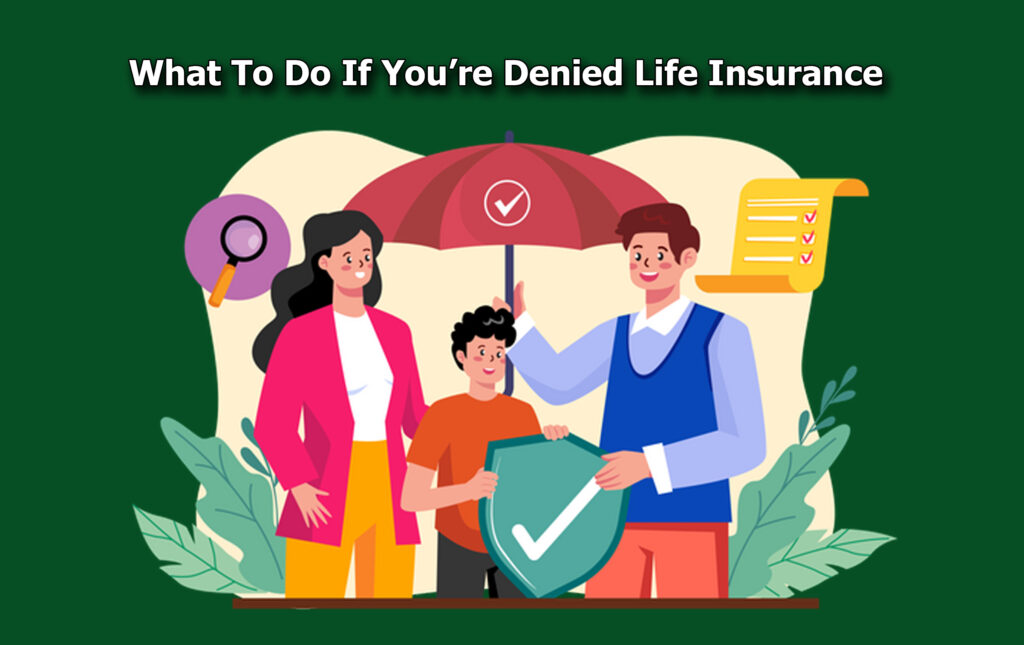What should you do if you’re denied life insurance? If you are feeling the weight of disappointment due to the fact that you were denied life insurance, this article is for you.

We are all aware of the fact that life insurance provides financial security and peace of mind for you and your loved ones. However, what happens if your application is denied? Many people assume that a life insurance rejection means they are uninsurable, but that is not always the case.
Insurers deny applications for various reasons, such as health conditions, risky lifestyles, or incomplete information. However, being denied life insurance does not mean you are out of options.
Understanding why your application was denied and knowing what to do when you’re denied life insurance can help you secure coverage in the future.
Common Reasons For Life Insurance Denial
Insurance companies will always assess different risks before they approve applications. If they find potential financial or health risks, they may decline coverage.
Risky Lifestyle Choices
There are certain lifestyle habits and career choices you have that may make you a high-risk applicant. Some of those activities include:
- Smoking or Substance Use: Tobacco use or history of substance abuse leads to higher premiums or denial.
- Extreme Hobbies: Activities such as skydiving, rock climbing, or racing can also affect eligibility.
- Dangerous Occupations: Extreme and hazardous jobs like firefighting, deep-sea diving, or piloting greatly increase the risks.
Health Issues
Health conditions are also massive factors that significantly influence life insurance approvals and premiums. Some factors include:
- Conditions like diabetes, heart disease, or cancer can result in you getting denied.
- Being overweight can increase health risks, leading insurers to reject applications.
- Depression, anxiety, or past suicide attempts may be red flags for insurers.
Financial And Application Issues
Mistakes in your application or financial instability can also cause rejection. There is a sense of mistrust on the insurer’s part because of false information, either intentionally or mistakenly. Other factors include:
- Providing inaccurate medical history or financial details may lead to denial.
- Some insurers assess financial stability before granting policies.
- Applying for excessive coverage beyond your income level may raise concerns.
Steps To Take After Being Denied Life Insurance
A denial does not mean you should give up completely on securing life insurance. Here are some actions you can take next instead:
Understand The Reason For Denial
Before you take any action, try to find out the reason why your application was rejected.
- Insurers provide a reason for denial, helping you identify areas for improvement.
- Ensure accuracy and address any discrepancies in your health history.
- Mistakes or missing information can sometimes lead to rejection.
Improve Your Eligibility
Making great lifestyle changes or addressing health concerns can increase your chances of approval. You can:
- Maintain a healthy weight, manage chronic conditions, and quit smoking.
- Avoid excessive debt, improve your credit score, and maintain steady employment.
- If denial was due to temporary health concerns, you can reapply after addressing the issue.
Seek Alternative Insurance Options
If traditional life insurance is not an option, you can also try considering alternative policies. Here are some considerable options available:
- Guaranteed Issue Life Insurance: Getting this insurance coverage doesn’t require a medical exam, but it does come with higher premiums and lower coverage.
- Simplified Issue Life Insurance: This option requires minimal medical screening, which makes it easier to qualify.
- Group Life Insurance: Employers, unions, or associations may offer coverage without strict underwriting.
Working With An Insurance Specialist
If you struggle to get approved, the next wise step to take is working with an insurance expert. Here are some steps to take:
Consult An Independent Insurance Agent
Independent agents work with multiple insurers and can find a policy that fits your needs. This greatly increases your chances of finding an insurer willing to cover you. Plus, they help match you with policies that fit your risk profile. Also, these agents can negotiate better terms based on your circumstances.
Consider A Medical Underwriting Review
Some insurance companies offer reconsideration if your health improves. Demonstrating better health may lead to policy approval. What’s more, some insurers allow reevaluation after a period of improvement. A specialist can advocate for you and present your case to insurers.
Frequently Asked Questions
Will A Life Insurance Denial Affect My Credit Score?
No, a life insurance denial does not impact your credit score, but insurers may check your financial history when assessing risk.
What If I Am Denied Due To A Pre-Existing Condition?
Consider guaranteed issue or simplified issue life insurance, which accepts applicants regardless of medical conditions.
How Long Should I Wait Before Reapplying?
It depends on the reason for denial. If the reason is health-related, then it is wise to wait until improvements are documented. If due to application errors, you may reapply immediately with correct details.



